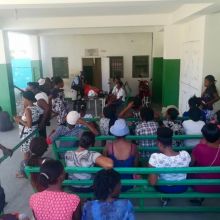
It’s barely 8:00 in the morning. We are in Saint Marc, Haiti. I just got to the hospital and am heading to my office at the antenatal clinic. Already, about thirty women are sitting on the benches lined up on the terrace, hoping to consult one of the nurses today. I myself am hoping that some of them are between 6 and 7 months of pregnancy and have not eaten yet. These are the first criteria to be met for them to be enrolled in the DYAMAN study.
DYAMAN (Diabète gestationnel, hYpertension Artérielle et issues MAternelles et Néonatales) is a research project conducted at Saint Nicolas Hospital in partnership with McGill University of Canada. This institution is located in the Artibonite region but serves a population from all over the country. The idea is to propose a strategy for screening and management of gestational diabetes, hypertension and peripartum cardiomyopathy in pregnant women attending the hospital’s antenatal clinic. This is the first gestational diabetes management initiative in the Haitian public system.
It’s me, Miss Jacquecilien, nurse and local study coordinator, who oversees the structure. I conduct the recruitment of participants, ensure their follow-up, refer them if necessary and consult them until 6 weeks after delivery. The statistician, Benjaminel Urimmaculus Scaïde, collects the study data. These women also benefit from consultations at the maternity ward for their delivery, at the Family Medicine Unit (UMF) for diabetes monitoring when diagnosed, and in Internal Medicine for two echocardiographic examinations at 36 weeks of gestation and at 6 weeks postpartum. The study is conducted under the supervision of Dr. Rodney Destine, Family Physician and Chief Maternity Dr. Waquinn Saint Loth. Patients do not have to worry about any fee; their care, the equipment and the medication provided are free of charge.
From June 2017 to this date, we recruited 687 pregnant women, of whom 128 were diagnosed with diabetes and/or hypertensive disorder. These numbers are disturbing. These are conditions that can have very serious consequences on the mothers’ and newborns’ health.
I settle in my office and make a few telephone reminders. This is one of the many tasks I like a lot. I have the contact of most participants and provided them with my phone number. Here, the nurse-patient relationship is important to ensure continuity of care.
I remember one patient who lived in Gonâve, a small island accessible only by boat or plane. Her story was truly moving. She was in her forties and at her ninth pregnancy. She could neither read nor write. She had been diagnosed with diabetes and thus needed to come to the hospital every two weeks as indicated by the clinical protocol. She was at risk for many complications, not only because of her illness but also because of her social situation. Her glycemic level was very high despite being placed on metformin and insulin. Most of his children had left the house. As she was unable to determine the prescribed dose of insulin, she could not give herself the needed injections. I used to call her, encouraging her to ask for help to take her medication. I would also call her eldest daughter who lived with her, or one of her sons living in the Dominican Republic to notify them of an upcoming follow-up visit. Sometimes, she would admit to not have enough to eat, or that she could not afford transportation to go to her appointment. Despite everything, she would do the utmost to get to the hospital whenever she could, even if it was not on the scheduled consultation day. At the end of July, her daughter called to warn me of her mother’s signs of delivery. Once at the hospital, thanks to the intervention of the maternity team, she gave birth to a beautiful boy apparently healthy but in hypoglycemia. The baby was transferred to pediatrics where he was treated without any complications. When she returned for her postpartum visit and her echocardiogram, the routine screening test revealed that her diabetes was still present. I strongly advised her to continue her follow-up at the UMF. However, I have lost contact with her since.
In this specific case, I was fortunate enough to be able to monitor her for the duration of her pregnancy. Unfortunately, this is not the case for many patients. For numerous reasons, including many factors related to the social determinants of health, some pregnant women cannot pursue with their hospital follow-up, and we have difficulty contacting them. This is why a community component would be so important. This would allow us to maintain close contact with our diabetic and hypertensive patients, to go to their house for follow-up when they cannot reach the hospital themselves, and to monitor their health and that of their child closely.
McGill University Global Health Programs and its partners draw on the expertise and resources of one of the world’s leading educational and research institutions.
Published:
January 24, 2019
Author:
Jacquecilien Widmise, DYAMAN Study Coordinator, McGill University
Categories:
SHARE THIS POST: